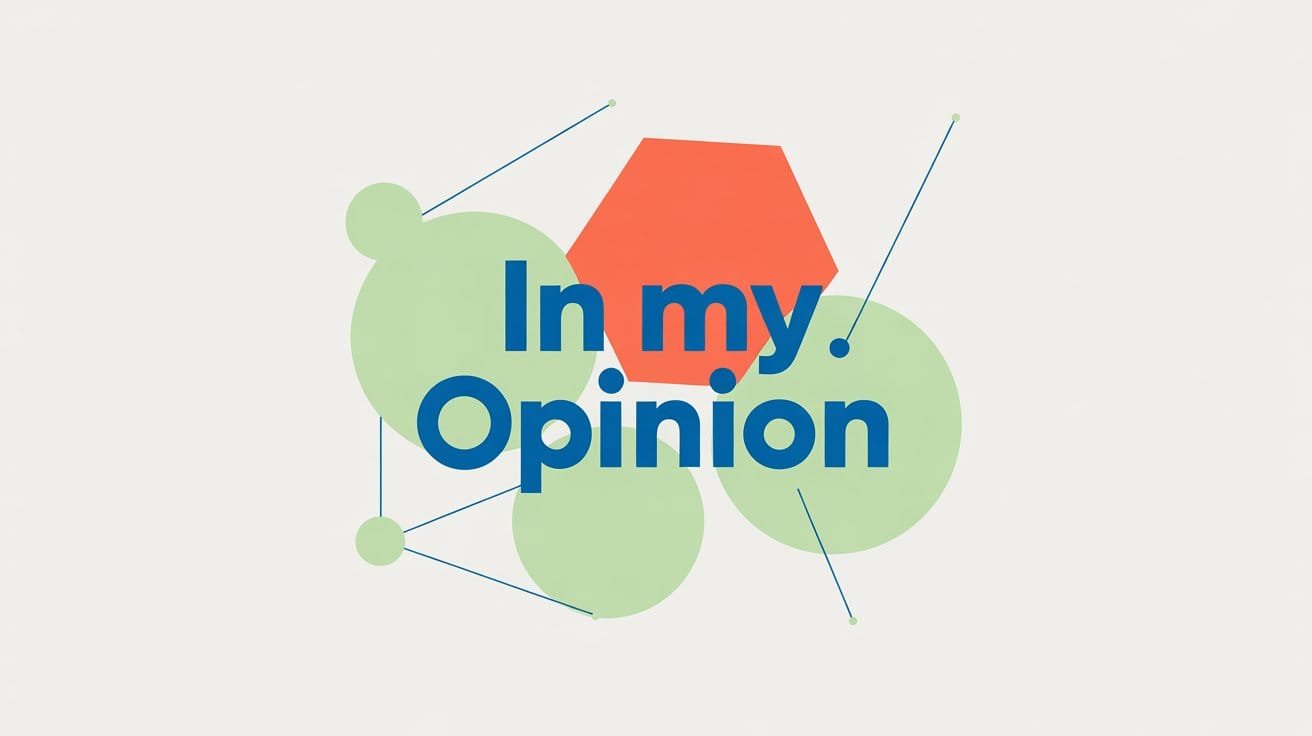The phrase “in my opinion” is a helpful way to share your thoughts or beliefs, especially when you want to sound respectful and open-minded. But using it too often can start to feel repetitive or lose its impact.
Synonyms for “In My Opinion”
Here are some better alternatives to help you avoid repeating “In my opinion”:
- I believe
- It seems to me that
- From my perspective
- I would argue that
- As I see it
- I think
When to Use “In My Opinion”
“In my opinion” is a common way to show that you’re sharing a personal view, not a fact. It works well in both speaking and writing when you want to express your thoughts without sounding too direct. Here are some situations where this phrase is especially useful:
In Essays or Academic Writing
This phrase works well in structured writing as it helps indicate that the statement reflects your analysis or perspective.
Example: In my opinion, this policy will not lead to long-term economic growth.
In Discussions or Debates
When you’re part of a conversation or debate, using this phrase can help express your thoughts respectfully while keeping the tone balanced.
Example: In my opinion, both sides make valid points, but stricter regulations are necessary.
In Professional or Workplace Settings
It helps share ideas in meetings or emails without sounding overly assertive, especially when offering suggestions or feedback.
Example: In my opinion, the team should consider a simple rollout plan for the update.
In Everyday Conversations
Commonly used in casual conversations to share your viewpoint clearly with friends, family, or peers.
Example: In my opinion, that movie was better than the original.
This phrase is flexible and widely accepted, but using different forms can help you sound more natural, especially when writing longer texts or speaking in formal settings.
Academic and Formal Alternatives to “In My Opinion” (With Examples)
I believe
Direct and widely accepted in both academic and professional settings.
I believe stricter environmental policies are essential for long-term sustainability.
I believe this approach offers the most balanced solution.
It seems to me that
Adds a subtle, reflective tone—ideal when you’re suggesting rather than asserting.
It seems to me that the results indicate a shift in consumer behavior.
It seems to me that the team may need additional support to meet the deadline.
I would argue that
Confident and assertive—best used when making a persuasive point.
I would argue that early exposure to reading improves cognitive development.
I would argue that the data supports a different conclusion.
From my perspective
Emphasizes personal experience or viewpoint, often used in discussions or reflective writing.
From my perspective, remote work has increased productivity.
From my perspective, the proposed solution lacks long-term viability.
I hold the view that
A formal and academic-sounding phrase often used in essays or opinion pieces.
I hold the view that education reform should prioritize accessibility.
I hold the view that collaboration leads to better outcomes.
Polite and Neutral Alternatives to “In My Opinion” (With Examples)
These alternatives are helpful when speaking in everyday conversations, group discussions, or informal writing. They help express your views without sounding too forceful or formal.
As I see it
Softens your statement while still making your perspective clear.
As I see it, we just need a better way to stay organized.
As I see it, there’s a better way to handle this situation.
To me
A casual, concise way to signal personal perspective—best for informal use.
To me, that explanation made the most sense.
To me, the film was more about character development than plot.
I think
Simple and commonly used—best in casual or semi-formal settings.
I think this method will save time and effort.
I think the current approach is solid, but there may be more efficient alternatives worth considering.
In my view
A polished alternative, slightly more formal than “I think.”
In my view, the proposal addresses most of the major concerns.
In my view, both ideas have potential, but we need more data.
The way I see it
Adds a conversational tone while keeping the meaning clear.
The way I see it, we’re already halfway to the goal.
The way I see it, this issue comes down to communication.
Professional and Assertive Alternatives to “In My Opinion” (With Examples)
These expressions work well in formal writing, presentations, or professional communication when you want to state your opinion with confidence and clarity.
It is my understanding that
Useful when referring to information you’ve interpreted or learned.
It is my understanding that the policy will take effect next quarter.
It is my understanding that the client has approved the final design.
I believe that
A formal and confident phrase, suitable for business writing, speeches, or persuasive essays.
I believe that strong communication is the foundation of effective teamwork.
I believe that the current strategy does not address long-term challenges.
I consider that
Direct and clear—often used when evaluating situations or offering input.
I consider that deadline unrealistic without additional resources.
I consider that both proposals deserve further review.
I find that
Best for observations or conclusions drawn from experience or data.
I find that open communication prevents most project delays.
I find that students respond better to practical examples than theory alone.
How to Choose the Right Phrase
While all of these expressions serve a similar purpose—to share your perspective—they’re not always interchangeable. Choosing the right phrase depends on your audience, tone, and purpose. Here are some tips to help you decide which one fits best:
Match the Tone to the Situation
In academic writing, professional emails, or presentations, it’s best to use more formal expressions. For everyday conversation or informal writing, a simple and more natural phrase is often more appropriate.
Formal: “I hold the view that…”
Casual: “To me…”
Consider the Audience
When speaking with someone senior, unfamiliar, or in a formal context, choose respectful and polished phrasing. A more relaxed tone is perfectly acceptable in conversations with peers or friends.
Professional audience: “It is my understanding that…”
Peer discussion: “As I see it…”
Vary Your Language in Longer Texts
To keep your writing clear and engaging, try not to repeat the same phrase when expressing multiple opinions in an essay, blog post, or email. Use a variety of alternatives to make your language feel more natural and intentional.
Don’t say “In my opinion” three times in one paragraph
Try “From my perspective,” “I believe,” “I think”
Use Stronger Phrases for Arguments
If you’re taking a clear stance or making a persuasive point, choose phrases that sound more assertive.
Use “I would argue that…” or “I take the position that…”
Avoid “I think…” when making strong claims



